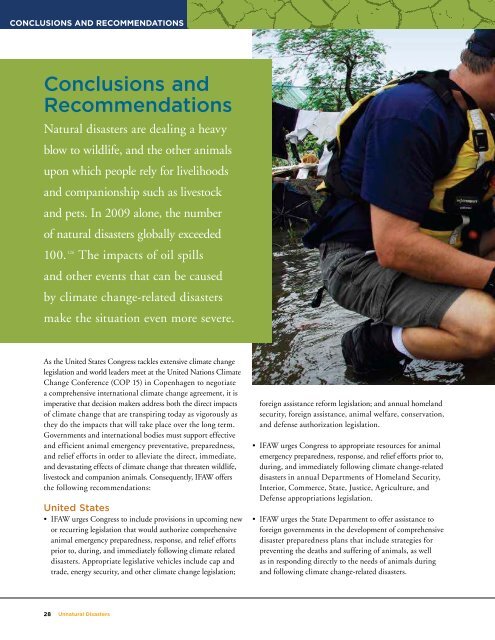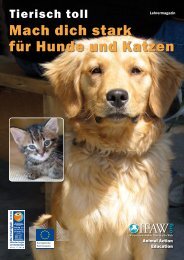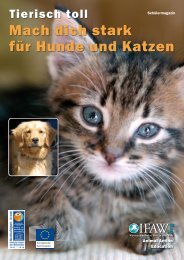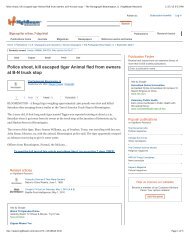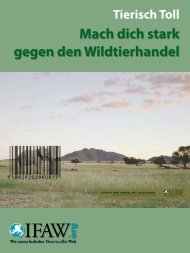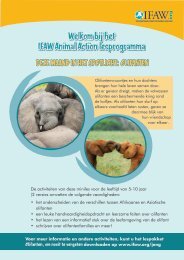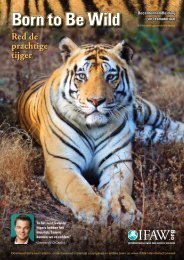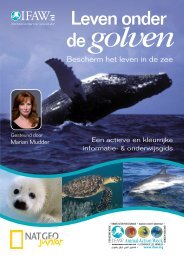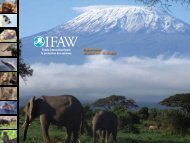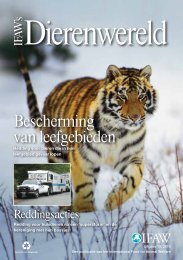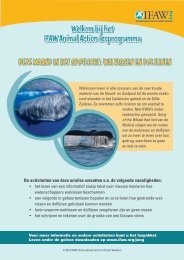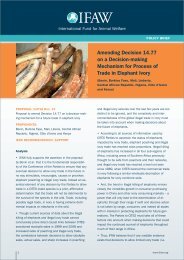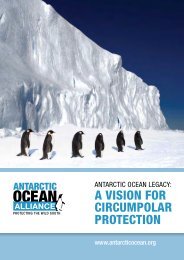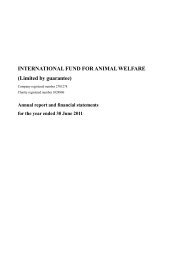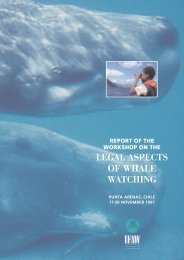Unnatural Disasters: The Impacts of Climate-related Emergencies
Unnatural Disasters: The Impacts of Climate-related Emergencies
Unnatural Disasters: The Impacts of Climate-related Emergencies
You also want an ePaper? Increase the reach of your titles
YUMPU automatically turns print PDFs into web optimized ePapers that Google loves.
ConClUsions anD reCommenDations<br />
Conclusions and<br />
Recommendations<br />
Natural disasters are dealing a heavy<br />
blow to wildlife, and the other animals<br />
upon which people rely for livelihoods<br />
and companionship such as livestock<br />
and pets. In 2009 alone, the number<br />
<strong>of</strong> natural disasters globally exceeded<br />
100. 126 <strong>The</strong> impacts <strong>of</strong> oil spills<br />
and other events that can be caused<br />
by climate change-<strong>related</strong> disasters<br />
make the situation even more severe.<br />
As the United States Congress tackles extensive climate change<br />
legislation and world leaders meet at the United Nations <strong>Climate</strong><br />
Change Conference (COP 15) in Copenhagen to negotiate<br />
a comprehensive international climate change agreement, it is<br />
imperative that decision makers address both the direct impacts<br />
<strong>of</strong> climate change that are transpiring today as vigorously as<br />
they do the impacts that will take place over the long term.<br />
Governments and international bodies must support effective<br />
and efficient animal emergency preventative, preparedness,<br />
and relief efforts in order to alleviate the direct, immediate,<br />
and devastating effects <strong>of</strong> climate change that threaten wildlife,<br />
livestock and companion animals. Consequently, IFAW <strong>of</strong>fers<br />
the following recommendations:<br />
United States<br />
• IFAW urges Congress to include provisions in upcoming new<br />
or recurring legislation that would authorize comprehensive<br />
animal emergency preparedness, response, and relief efforts<br />
prior to, during, and immediately following climate <strong>related</strong><br />
disasters. Appropriate legislative vehicles include cap and<br />
trade, energy security, and other climate change legislation;<br />
foreign assistance reform legislation; and annual homeland<br />
security, foreign assistance, animal welfare, conservation,<br />
and defense authorization legislation.<br />
• IFAW urges Congress to appropriate resources for animal<br />
emergency preparedness, response, and relief efforts prior to,<br />
during, and immediately following climate change-<strong>related</strong><br />
disasters in annual Departments <strong>of</strong> Homeland Security,<br />
Interior, Commerce, State, Justice, Agriculture, and<br />
Defense appropriations legislation.<br />
• IFAW urges the State Department to <strong>of</strong>fer assistance to<br />
foreign governments in the development <strong>of</strong> comprehensive<br />
disaster preparedness plans that include strategies for<br />
preventing the deaths and suffering <strong>of</strong> animals, as well<br />
as in responding directly to the needs <strong>of</strong> animals during<br />
and following climate change-<strong>related</strong> disasters.<br />
IFAW emergency Relief teams handed out<br />
humanitarian aid and continued animal relief<br />
efforts in the Philippines following typhoon Ketsana.<br />
United Nations and Other<br />
Intergovernmental Organizations<br />
• IFAW urges the United Nations to achieve a Universal<br />
Declaration on Animal Welfare that encourages people and<br />
governments to consider animals in disaster preparedness and<br />
response efforts surrounding climate change-<strong>related</strong> disasters.<br />
• IFAW urges the Office for the Coordination <strong>of</strong> Humanitarian<br />
Affairs (OCHA), the UN entity that oversees and facilitates<br />
the disaster-relief efforts <strong>of</strong> the UN system, and other similar<br />
entities to consider animals in coordinating disaster preparedness<br />
and response efforts surrounding climate change-<strong>related</strong><br />
disasters. Examples include developing partnerships with<br />
non-governmental organizations with expertise in animal<br />
emergency relief to deliver assistance to animals in need<br />
and ensuring that emergency response personnel are trained<br />
to mitigate the impacts <strong>of</strong> climate-<strong>related</strong> disasters on animals.<br />
© IFAW/M. Booth<br />
Non-Governmental Organizations<br />
and the Private Sector<br />
• IFAW urges non-governmental organizations and private<br />
sector groups that provide humanitarian relief during and<br />
following natural disasters to develop partnerships with<br />
non-governmental organizations with expertise in animal<br />
emergency relief to exchange information and skills and<br />
collaborate on emergency relief efforts to minimize the<br />
suffering and loss <strong>of</strong> life to animals and communities.<br />
• IFAW urges environmental organizations and financial<br />
supporters that are currently focusing on addressing the<br />
long-term impacts <strong>of</strong> climate change to also direct resources<br />
towards mitigating the immediate impacts <strong>of</strong> climate change<br />
and climate change-<strong>related</strong> disasters on wildlife, companion<br />
animals, and livestock by supporting animal emergency<br />
preparedness and relief efforts.<br />
28 <strong>Unnatural</strong> <strong>Disasters</strong><br />
International Fund for Animal Welfare 29


